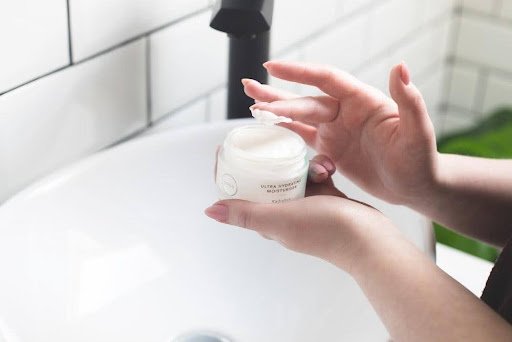The beauty and cosmetic industry teems with products that can aid your skincare goals in one way or another. Most of these formulations are designed to enhance facial radiance and keep your skin moisturized for longer.
However, certain topicals are especially beloved for their anti-aging properties. Such products can fend off the markers of premature aging and preserve your skin’s youthfulness.
This article will investigate the role of face creams in your anti-aging skincare routine.

What Is A Face Cream?
A face cream, also known as facial cream, is a topical product designed to be applied to the facial skin to preserve its softness and lock moisture in.
Many face creams are emulsifications of water-based and oil-based ingredients. The water-based compounds help rehydrate your face, while the oil-based compounds provide a barrier against moisture loss and dryness.
Some facial creams contain potent anti-aging compounds in addition to their skin-softening and moisturizing properties. A noteworthy mention is Creme Dermopurifiante.
Creme Dermopurifiante is a purifying face cream by Biologique Recherche, a global brand of dermatologically approved skincare products. This topical is effective for users with imbalanced skin. It’s also recommended for treating inflammation, redness, sunburn, and skin breakouts like acne, psoriasis, and eczema.
While most face creams enhance facial radiance, Creme Dermopurifiante rejuvenates and mattifies the skin. The product may shield your epidermis from external aggressions, such as the sun’s ultraviolet (UV) rays.
Top Beneficial Ingredients in Facial Creams
Face creams are formulated specifically for facial application.
The face is one of the most sensitive body parts. It’s also the part directly exposed to weather and sunlight damage.
Therefore, extreme caution is paramount when choosing a facial cream. The primary focus here should be the active ingredients in the product.
Facial creams can pack a variety of natural and synthetic compounds, with each serving specific functions. The most beneficial ingredients include;
1. Moisturizers
Moisturizers help rehydrate your face by locking moisture in the skin.
Hyaluronic acid is one of the most common moisturizers in facial creams. The compound prevents moisture loss while enhancing the skin’s flexibility. It also reduces fine lines and wrinkles, preserving your face’s youthful radiance.
Hyaluronic acid, with its remarkably high absorption rate, may further reduce scarring and accelerate wound healing. It provides fast and reliable skincare benefits.
Other common moisturizing ingredients in face masks include lactic acid, glycerin, coconut oil, Aloe vera, and Shea butter.

2. Softeners
Softeners and moisturizers share one critical function – locking moisture firmly in the skin.
Softeners may also treat dry, chapped, or scarred skin like moisturizers.
However, most softeners typically have a higher onset time than moisturizers. Some softeners also possess pH-balancing effects, allowing them to combat acne breakouts, irritation and inflammation.
Examples of softeners in facial creams include hyaluronic acid, azelaic acid, and glycerin.
3. Anti-Aging Compounds
Many facial creams you’ll come across contain decent amounts of softeners and moisturizers. However, only a handful are formulated with powerful anti-aging compounds.
A face cream’s anti-aging properties depend on its concentration of antioxidants.
Antioxidants neutralize oxidative stress caused by free radicals build up around body cells. While mostly linked to reducing the risks of chronic illnesses, antioxidants may also preserve skin’s youthfulness by fighting the early onset of aging symptoms, particularly wrinkles and fine lines.
In facial creams, vitamin C, ascorbic acid, is a noteworthy anti-aging compound.
Ascorbic acid is best known for supporting the healthy development of bones, cartilage, blood vessels, and skin. As an anti-aging compound, the vitamin stimulates collagen biosynthesis.
Collagen is a protein that constitutes the primary structural component of the skin’s tissues and muscles. Studies have linked high collagen production with enhanced skin rejuvenation.
Vitamin A, also called retinol, is another powerful antioxidant in many facial creams.
Retinol possesses remarkable vision-aiding properties. The vitamin may also work synergistically with ascorbic acid to slow the natural aging.
Other common antioxidants in face creams include vitamin E and niacinamide.
In the same vein, avoiding face creams laced with toxic compounds is important. The general rule is to prioritize products free from or containing minimal amounts of synthetic additives like fragrances.

Harnessing Face Cream Benefits Through Proper Application
One exciting thing about face creams is that you can apply them anytime, depending on the intended effects.
Adding a face cream to your morning skincare routine helps your skin stay hydrated through excruciating daytime heat. Meanwhile, applying the topical in the evening provides optimal anti-aging benefits, as the antioxidants in the product have several hours to penetrate deeper into the skin.
To apply a face cream, start by cleansing or exfoliating your face. This helps to remove dirt, dead cells, and makeup residues.
Now, dab the cream on the center of your face, and then apply it in a circular motion, working your way outwards. Gently massage the corners of your eyebrows to unlock the product’s vision-aiding properties.
Remember to keep your face cream from delicate facial parts, such as your eyes, nose, and mouth.

Final Word
The efficacy of face creams depends on their active ingredients. Therefore, it’s imperative to research these topicals carefully before adding them to your skincare routine.
Insist on products loaded with powerful antioxidants while shunning those laced with potentially toxic chemicals. Including moisturizers and anti-inflammatory compounds in a face cream is an added advantage.
